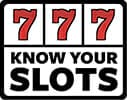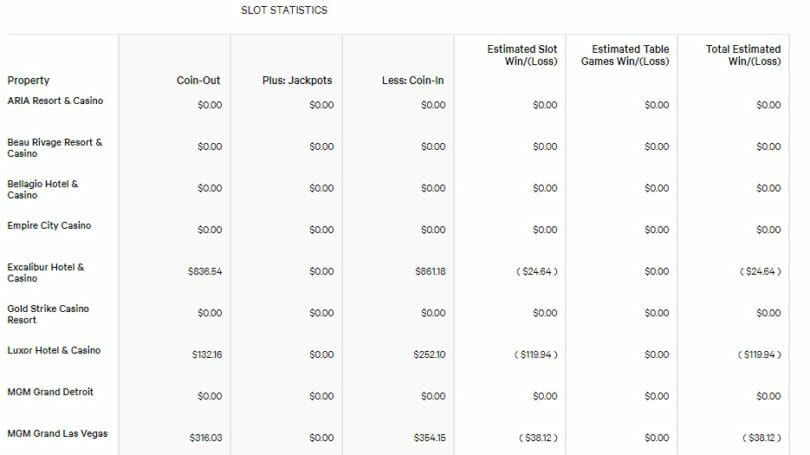Casinos are known for providing ups and downs financially. Most players use a players card whenever they’re on a casino property, and that players card compiles a lot of data that helps the casino’s marketing department develop offers to bring players back into a casino.
However, one concrete way where this data becomes available to the player, in a helpful way, is the production of win/loss records.
What a Win/Loss Record Provides
The way each casino handles this varies widely, but the general concept is the same – how much did you win or lose on slots, and how much did you win or lose on table games.
This data is generally presented in a calendar year format on an annual basis. Some are mailed, some are available online through casinos’ online portals, and some (mostly at smaller or less tech-savvy casinos) require the filling out of a form to request the documentation, which will be sent out after it’s processed.
Depending on what else is offered, there may be additional fields of data presented on the report, and some casinos go above and beyond this, which I’ll talk about shortly, but that’s the basic goal.
Why do these records matter? They can help reinforce gambling logs and other data to show a more complete gambling picture when you have taxable gambling wins you’re offsetting with gambling losses on your tax return. For players, they can also be a helpful insight into how much they’re spending over time, so budgets can be made or adjusted.
More Complete Win/Loss Reporting
If you get a win/loss statement from a company that owns multiple casinos, it will generally itemize each casino and the win/loss at each on a single report. This is the case for Caesars Rewards and Mlife reports.
Mlife takes it quite a bit further than Caesars; Mlife’s online portal lets you filter by month if you wish, not just by year. Mlife also shows the coin-in and coin-out on slots, which can help offer more precision in how much gambling was done in a year.
By comparison, Caesars only offers a number per casino per year of wins and losses of slots and table games.
Penn National’s website for its casinos, mychoice, offers very basic monthly reporting for the last three years, as well as an annual PDF download of wins/losses at each casino.
As you can expect, smaller casinos or less tech savvy casinos likely offer the bare minimum. Larger chains tend to have a bit more to work with at their disposal and offer more.
Where Win/Loss Records Fall Short
Win/loss records generally separate slots from tables because the data sourcing is different. Slots are actual recorded wagers while your card is registered properly in a machine. These records are incomplete only when the machine doesn’t properly read a card, or a player forgets to insert or activate their players’ card. Taxable jackpots are generally listed as well, which help complete the picture.
Meanwhile, table games are estimated wins/losses – the data is entered into a computer most times nowadays at a given table, but sometimes buy-ins or cashouts are either entered incorrectly or are missed, leaving gaps in the data.
This is why this reporting is secondary – win/loss statements are not generally acceptable as a primary record when it comes to the IRS. Merged with other information, it can help reinforce gambling history, but the lack of detail and the high risk of errors means they’re not helpful as a primary source.
I see a lot of players citing that they used this data to file their tax returns. The thing that’s important to recognize is that it’s the audit potential where this actually matters, not the filing of taxes.
Your documentation for gambling losses isn’t verified in any meaningful way when you file your taxes, but if you’re audited and don’t have what the IRS recommends you maintain on its website, you could be forced to pay the taxes, and penalties, on any gambling winnings you wrote off at a minimum.
All players who gamble heavily enough to get taxable wins they want to consider offsetting should seek the advice of an accountant well versed in the IRS’s position on these matters (which isn’t me), but should be very careful accepting a random player’s information (which, frankly, includes me).
I tend to take a more risk averse position on these matters, hence my advice, but I also don’t tend to get a lot of taxable wins that requires an offset.








I got my win /loss stmt for 2021 and it showed that i loss $6,231 including my wins from jackpots. It showed coins out $120,880, coins in $105,378, jackpots $9,271. I know I did not withdraw $100,000 from my bank to play. I go once a week and bring about $300 each time. My husband controls the banks so there is no way I could have withdrawn $100k for gambling. We are both retired and on social security around $50k for both of us. SO what is included in these numbers. There is a dollar sign $ in front of these coins. Does this mean it’s $1 per coin? My guess is:
1- weekly comp money $60 each week for slots ( i do not play table)
2- periodic comps from vaults, high limits, piggy bank around $50 per week (for slots)
3 – comps for food $100 per week
Anything else? The casino has to write off comps for food etc… as expenses to offset their profits don’t they?
Can you help make sense out of this for me. Thanks.
Hi Susie – take a look at this article I posted last week on reading win/loss records to see if it helps you understand the coin-in/out portion of things. I specifically cover how your coin-in and coin-out can get that high.
Don’t understand slot wager # ON MY CASINO PAPER . IT SAYS SLOT WAGER $109.495.94. SLOT WIN LOSS $10.703.50. I KNOW I DID NOT GAMBLE 100 THOUSAND . CAN U TELL ME WHAT THUS MEANS PLEASE CAN I CLAIM SOME OF THIS I DID NOT WIN ANY Jackpots WHAT SO EVER. SMALL 700.OO – 1000.00 DOLLARS BUT NO HAND PAYOUTS
Hi Ron – this article may be more helpful for you:
https://www.knowyourslots.com/understanding-win-loss-records-did-i-really-spend-that-much/